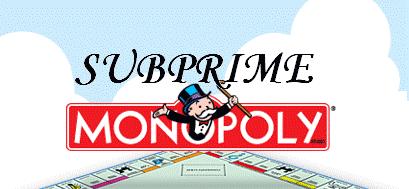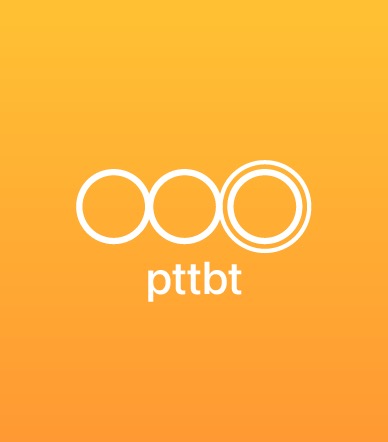Monopoly Game Gets Modern Update

Just in time for the holiday season, the Parker Brothers company is announcing a major revamping of its flagship board game in a new release it is calling, “Subprime Monopoly”.
Whereas players in the original Monopoly earned money to buy and develop properties at fixed prices, in “Subprime Monopoly” players borrow obscene amounts of money to purchase overvalued properties with skyrocketing prices and borrowing costs.
“With the advent of the ongoing housing bubble and mortgage loan crisis, we thought the time was right to make some major changes to the rules of the game”, says Parker Bros. creative director Mitt Mason. Originally invented by Charles Darrow in 1935, Monopoly first became a huge hit in the middle of the great depression, and has since been played by over 750 million people. “It seemed somehow fitting that we change the rules now that property prices are falling nationwide, given that the game was first popularized the last time this happened in the 1930’s. And the way Americans buy and sell property has changed a lot since then. Who in America buys anything these days with money they have actually saved up, and who today buys property at a stable and reasonable price?”
While the goal of the original version was to end the game with the most money, in the revamped version all players finish the game broke or highly in debt, competing to finish with the least total debt and lowest number of foreclosures.
Rules updated
Players still move around the same classic Monopoly board buying properties and collecting rent, but with a few key differences. In Subprime Monopoly, the game is split into two phases. The game begins in the “Irrational Realty Whore” phase, during which every player must buy any unowned property that his/her piece lands on, regardless of price, and develop houses and hotels on every owned property to the maximum potential. Every time a player passes ‘GO’ during this phase of play, all property, development, and borrowing costs in the game double for everyone, while rent fees always stay absolutely the same. Players undoubtedly end up borrowing large sums from the Monopoly bank to finance these purchases.
After all players have navigated the entire board three times, the “Reality Sets In” phase kicks in, and the rules dictate that the bank stop lending money to players. At this point, it is not long before all the players can no longer finance their debts, and so property investments are foreclosed for pennies on the dollar. Finally, one lone player not quite yet in solvency emerges the winner of the game with a mountain-load of debt and a pile of properties that nobody else is left to buy.
“I don’t think I’m exagerrating when I say it really is fun for the whole family”, beams Mason. “There’s nothing that says 21st century America quite like a night of living beyond one’s means, destroying your credit, and happily following an investment ponzi scheme that is doomed to failure”. Indeed, Mason planned to call the game, “Housing Doom Monopoly”, but changed the name at the last minute in order to not be confused with a popular U.S. housing bubble commentary website.
[Editor - story can end here]
Gameboard mostly unchanged
Unlike other recent versions of the game, Subprime Monopoly has left most of the game board design the same as the original. “We figured that the gimmick of changing the gameboard’s property names to a given city’s landmarks, or breeds of cats and dogs, just isn’t as invigorating as it used to be.”
One thing that has changed, however, is the game cards. Previously, a “Community Chest” or “Chance” card may have read, “Congratulations! You have won $15 in a beauty contest”. In the new game, these have been replaced by “Fat Chance” and “Mainstream Media Drivel” cards that say things like, “Congratulations! Your local newspaper has published yet another article validating that house prices will only ever keep going up, forever and ever, and that your mundane town is a ‘World Class’ city that everybody and their dog wants to live in! Pay $35,000 for renovations on every property you own.”
Disapproval from Realtors
Not everyone is excited about the new game, however. “This is disgusting. It makes a mockery of some very real and pressing issues surrounding American society today”, says National Association of Realtors guru-in-training Sammy ‘Slick’ Schmillers, “, issues like why aren’t people still out there buying up more homes? For crying out loud, stop wasting your time playing these stupid games, and get back to the business of borrowing more real money and buying more homes for your family! If we’ve told you once we’ve told you a million times, prices ain’t ever coming down, so what have you got to lose? Get out there and buy, buy, buy!”
But even Schmillers could see a possible silver lining in the release of the game. “After citing journalists, bloggers, and even the weather as reasons for recent housing downturns, we’re running a little low on new ideas. I suppose at the very least this game gives us a new outlet for blame.”
[Editor - story can also end here]
More Educational Gameplay
Parker Brothers is also keen to point out the educational value attached to the new rules. “The original was always meant to teach children and families about the value of saving money to buy real estate, but how useful is that today? Now, children playing will be forced to learn about concepts much more applicable to modern American life, like escalating interest rates, frenzied investing, liar loans, and how to file for chapter 11. And if we’re really lucky, maybe the kids will teach mom and dad what that’s all about, too.”
A more subtle change from the original gameplay is the concept of who owns what. Just like Americans today, players in Subprime Monopoly don’t end the game as property owners. Whereas in the original game, players owned properties with homes, players of the new version only own massive debt backed by overvalued assets, and so in fact the Monopoly bank owns the players.
